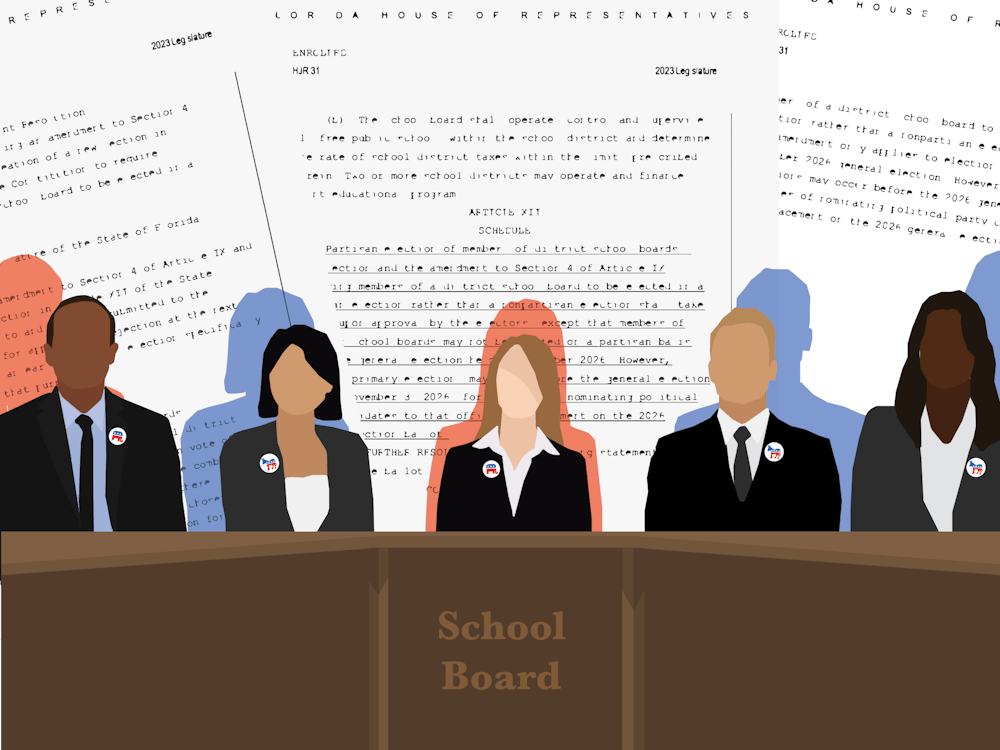In the 2024 general election, voters will decide whether district school board candidates should run under a political affiliation.
House Bill 31 proposes to amend Florida’s constitution. If passed, voters can expect to see party affiliation next to the names of candidates running for district school board positions.
District school board members have been elected in nonpartisan elections since 2000. Previously, candidates affiliated with a specific party when running.
The amendment must be approved by 60 percent of voters during the 2024 elections and will not be eligible for the governor’s veto powers.
If approved, the proposed change will apply to elections during and after Nov. 3, 2026, as well as primaries leading up to the 2026 general election.
School board decisions impact everyone in a county and, regardless of party affiliation, candidates should appeal to a broad base of voters, said Tina Certain, the Alachua County School Board Chair.
“It's important to me that the race stays nonpartisan because everyone is impacted by school decisions,” Certain said. “It doesn't matter what your political affiliation is, and I think everyone should get to vote and have a voice on a candidate, not just based on your political registration during the time of the election.”
Certain first noticed a party affiliation playing a part in the elections in 2020 once Gov. Ron DeSantis began backing candidates.
“We're seeing more politicization in education because of the governor of Florida’s actions. That is not rising up from local communities,” Certain said. “It's coming down from Tallahassee, from the governor, down.”
In the 2022 election cycle, 20 of the 30 local school board candidates backed by Gov. DeSantis won their seats.
Daniel Clay Fisher ran for School Board District 1 but lost. For Fisher, the current political climate intersects with education regardless of whether the races were nonpartisan.
“We'd like to think that people will listen to ideas and actually judge a candidate,” Fisher said. “Unfortunately, I just think that ship has sailed and it's a matter of which party gets out the most [to] vote is the party that's going to win.”
Non-partisan organizations, specifically the teachers union, historically have been affiliated with the Democratic party, Fisher said.
“If your unions are lined under political parties, and the vast majority of your teachers are lined under political parties, then how are you ever really going to have a nonpartisan race?” Fisher said.
Carmen Ward, president of the Alachua County Education Association, has spent 33 years in education, starting out in the Wiles Elementary School afterschool program in 1990.
The bill is an attack on the public education system, Ward said, and feels politics and education should stay separate.
“I do not think there's any place for partisan politics in our public education system,” she said. “We should be fully focused on what's best for students.”
The politicization of school board elections comes from a statewide attempt to erode education systems, Ward said.
“I feel like public education is under attack, and part of the attack is sowing the seeds of division,” she said. “I think this is part of the culture war strategy that is being perpetrated on classrooms, on educators and public school systems by our leadership.”
Katherine Canev, an 18-year-old incoming UF freshman and Gainesville High School graduate, believes the law would be harmful to education in the state but beneficial for right-leaning counties.
“The way Congressional districts are cut, I believe that more school districts that fall into ‘red zones’ of Republican majority would fall under conservative school boards, thus expanding DeSantis’s overreach,” Canev wrote. Canev also is unhappy with how politics has permeated recent curriculum decisions.
“DeSantis has already censored topics such as sexuality and menstruation in schools and has even mandated the falsification and white-washing of history,” she said. “I’m tired of the Florida government attacking education, and I think this motion to make school board elections partisan will further their efforts to polarize education.”
The Florida Supreme Court will revise the wording of the constitutional amendments that will be presented on the ballot to ensure the language is clear and concise, said Aaron Klein, the director of communications and outreach with the Alachua County Supervisor of Elections Office.
Currently, it is unclear where the question will appear on the ballot. However, Klein wants to make it clear that the top of the ballot is not the only important part of the ballot.
Statewide primaries begin August 2024. Voters can check their voter registration status by calling the Alachua County Supervisor of Elections Office.
Contact Gabriel Velasquez Neira at gvelasquezneira@alligator.org. Follow him on Twitter @gvelasquezn.
Gabriel Velasquez Neira is a second-year Journalism major, and the Audio Editor and Metro GA Reporter. In his free time, he enjoys sleeping, taking photos and playing guitar.






